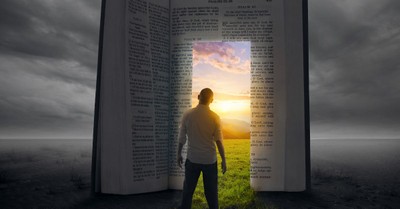God’s Protective Care - Today's Insight - June 25, 2018
God’s Protective Care
The first verse of Psalm 91, a song about battling the forces of evil, establishes the context for everything that follows. So, let's examine these two lines closely.
Protection amid Evil
We must never forget that believers in the Lord Jesus Christ are not removed from the presence of wickedness. In fact, our Savior prayed specifically: "I do not ask You to take them out of the world, but to keep them from the evil one" (John 17:15). While it's difficult to understand the reason, God has planned that we continue to live in a hostile, wicked, non-Christian world system (kosmos). He deliberately did not remove us from an atmosphere of hostility. Instead, He has promised to preserve us through the conflict. He has made possible a plan of insulation, not isolation. God isn't interested in our isolating ourselves, hidden away like hermits in a cave, but rather in our living courageously on the front lines, claiming His insulation amid an evil environment.
In order for us to enjoy the benefits of insulation, we must live in the light of Psalm 91, which uses analogy and metaphor to convey spiritual truths. The secret to survival is to "dwell in the shelter of the Most High," to "abide in the shadow of the Almighty."
The word "dwell" (Psalm 91:1) is translated from the Hebrew yashav, meaning "to remain, sit, abide." The term conveys the idea of permanence. The verb "dwell" is used figuratively to mean "live in conscious fellowship with, draw daily strength from." In the same way someone might "live off the land," we are encouraged to draw our needs from God. This requires an attitude of continual awareness of the Lord's presence and involvement. The idea is developed further with the term "shelter" in verse 1. This original word is sathar, meaning "cove, covert, secret hideaway." A group of soldiers caught behind enemy lines need to find a place to rest that's hidden from view and therefore safe from the enemy. The Lord is said to be our refuge, where we can find safety and rest.
Before going any further, let me emphasize that Psalm 91 is written to dwellers. It promises deliverance and protection not to everyone, but to dwellers—those who draw daily, habitual strength from their Lord as they sustain an intimacy of fellowship and nearness with Him. Don't forget that!
We are told in the last part of verse 1 that as this close fellowship is maintained, we shall "abide in the shadow of the Almighty." Now we come upon a different Hebrew term translated "abide." It is lūn, meaning "to lodge, pass the night." It conveys a periodic rest or stopover for lodging.
What is verse 1 actually saying? Simply this: If we who know the Lord Jesus Christ will dwell in conscious fellowship with Him (keeping our sins confessed and forsaken, and walking in moment-by-moment dependence upon Him), we shall enjoy the benefits of living under His protective care on those occasions when rest and lodging are needed. If we maintain our walk with Him, we can count on Him and His deliverance at periodic times when the going gets rough.
The song continues to develop the idea of safety and refuge from the attacks of Satan with images of warfare.
I will say to the LORD, "My refuge and my fortress,
My God, in whom I trust!" (91:2)
A "refuge" is a place of rest. A "fortress" is a place of defense. Notice that this does not say the Lord will provide these things. Rather, it says that the Lord is these things. This is why our dwelling in Him is essential; it is in Him alone that we will find rest and defense. Take time to consider the last word in verse 2: trust. It is a translation of the same Hebrew term found in Proverbs 3:5.
Trust in the LORD with all your heart
And do not lean on your own understanding.
This calls for total trust. A construction laborer working forty stories above the city street depends upon a lanyard to keep him from falling should he lose his balance. He trusts that the cable and harness will support him in an emergency. He must put complete trust in his safety equipment. That is the kind of trust our Lord wants from us.
Adapted from Charles R. Swindoll, Living the Psalms: Encouragement for the Daily Grind (Brentwood, Tenn.: Worthy Publishing, a division of Worthy Media, Inc., 2012). Copyright © 2012 by Charles R. Swindoll, Inc. All rights are reserved. Used by permission.
Used with permission. All rights reserved.
Listen to today's broadcast of Insight for Living with Chuck Swindoll at OnePlace.com.
Visit the Bible-teaching ministry of Chuck Swindoll at www.insight.org.




















